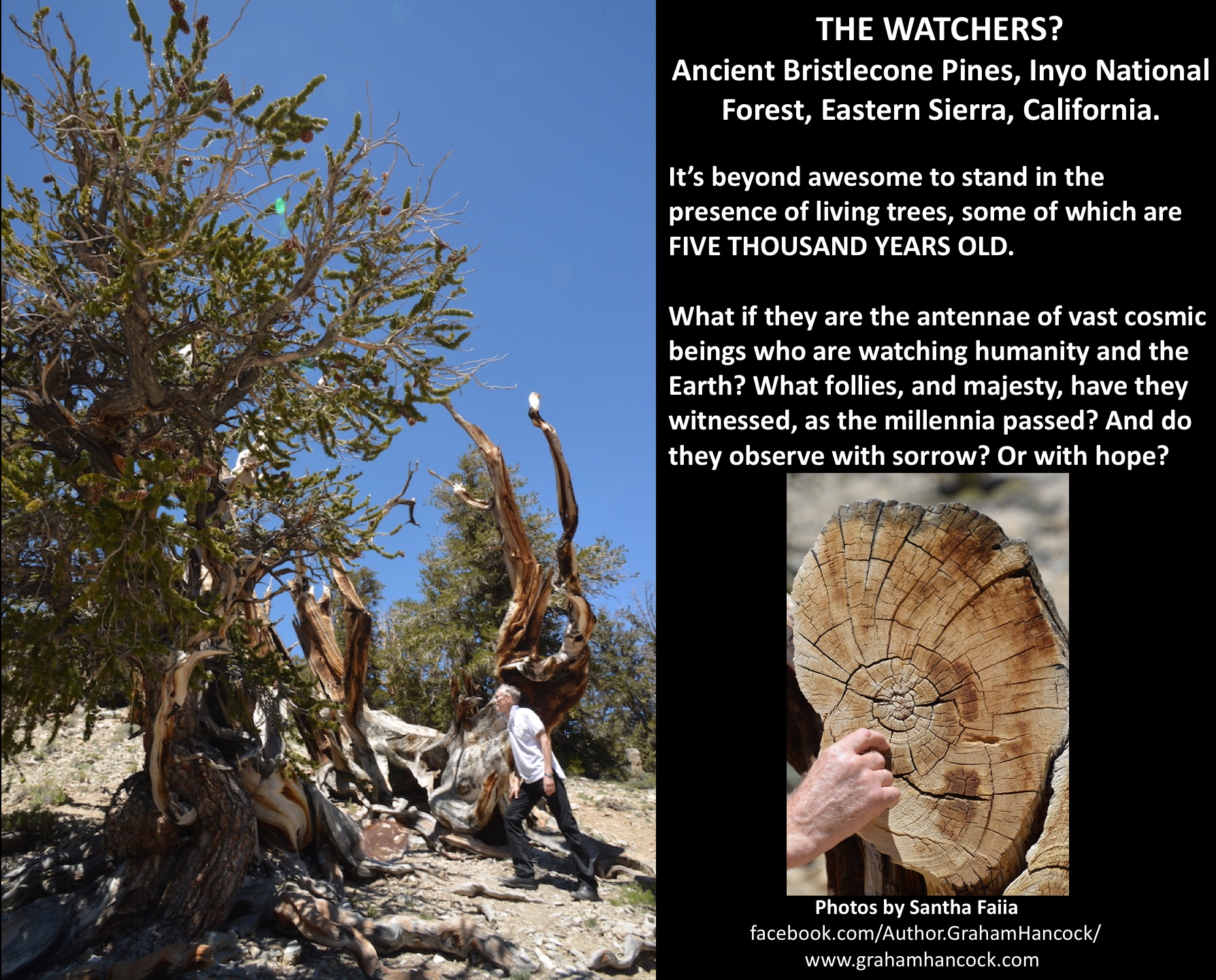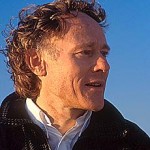These Bristlecone Pines, which Santha and I visited on a recent research trip across the US, are so old that the annual growth rings from living and dead trees can be overlapped giving a continuous climate record for more than eleven thousand years and allowing radiocarbon dates, at least within that timeframe, to be calibrated fairly precisely. Check out dendrochronology…

- Could the Epic of Gilgamesh, previously attributed to the Sumerians around 4,000 years ago, date back more than 10,000 years?, 2025-06-23
- Under Giza, 2025-04-17
- Fact-checking science communicator Flint Dibble on Joe Rogan Experience episode 2136, 2024-10-11
- Gobekli Tepe: Gradual evolution? Or transfer of technology? Or both?, 2024-04-14
- Response by Graham Hancock (GH) to the open letter to Netflix dated 30th November 2022 from the Society for American Archaeology (SAA) concerning the eight-part docuseries Ancient Apocalypse presented by Graham Hancock, 2023-01-30
- Debate: Author Graham Hancock vs Archaeologist Flint Dibble on the Joe Rogan Experience, October 2023, 2023-01-30
- For the Record, 2022-12-15
- Put Your Money Where Your Mouth Is, 2022-12-10
- The Amazon Mystery, 2022-05-31
- Visionary, Chapter Fourteen: The Secret Commonwealth, 2022-05-07
- Beyond the Brain: Graham Hancock and Rupert Sheldrake explore the mystery of consciousness, 2022-01-30
- Karahan Tepe, Gobekli Tepe’s 12,000-years-old “Sister Site”, Begins To Reveal Its Secrets, 2021-10-11
- Message from a Mastodon, 2020-12-08
- Crick’s LSD, 2020-08-22
- Love not fear…, 2020-08-19
- Were psychedelics used in the ancient world?, 2020-07-25
- Archaeology and War God, 2020-07-22
- Important New Book By Mainstream Geologist Provides Huge Support For Comet Impact And Global Cataclysm 12,800 Years Ago, 2020-06-24
- Stuff just keeps on getting older…, 2019-12-28
- Response from Graham Hancock to the Society for American Archaeology, 2019-11-25
- Video trailer for America Before and full details of my forthcoming events, 2019-03-13
- Speaking tour — America Before: The Key to Earth’s Lost Civilization, 2019-02-17
- Returning to Ayahuasca after three years away — night 4, 2018-12-01
- Returning to Ayahuasca after three years away — nights 2 and 3, 2018-11-29
- Returning to Ayahuasca after three years away, 2018-11-27
- On Writing (2), 2018-05-09
- The Wild Ride, 2018-04-27
- On writing…, 2018-04-26
- Announcing AMERICA BEFORE as the title of my forthcoming book…, 2018-02-15
- Muck, Mammoths and Extinctions: was Alaska the scene of a giant cataclysm at the end of the Ice Age?, 2017-08-28
- Back from the gates of death, 2017-08-22
- Why Science Should Cherish Its Rebels, 2017-04-30
- Standing Rock: Water Is Life, 2016-12-24
- Reaching out – the Joe Rogan Experience & beyond. Follow-up & further events, 2016-11-14
- Cosmic impacts and the past and future of civilization, 2016-10-14
- Invitation for comments and suggestions re my planned next book, 2016-10-10
- Exclusive: Extract from forthcoming Volume 3 of the War God series by Graham Hancock, 2016-09-28
- New Interview, 11 mins, on RT, 2016-08-15
- More evidence that TED believes it knows what we should think…, 2016-08-03
- Magicians of the Gods Paperback published UK 11 August, 2016-07-29
- New technology to explore mysterious DMT realms., 2016-07-15
- The Watchers?
- Contact! Plants, Aliens And The Human Future, 2016-06-16
- Is The House Of History Built On Foundations Of Sand?, 2016-06-09
- Ancient aliens? Or a lost civilization?, 2016-05-23
- Gobekli Tepe image on Sumerian tablet?, 2016-05-17
- Stuff just keeps on getting older — the peopling of the Americas, 2016-05-15
- Ancient Aliens or a Lost Civilization?, 2016-05-11
- Is there life after death?, 2016-05-10
- Interviews…, 2016-04-24
- Asteroid flyby, 2016-03-02
- Awakening Osiris, 2016-02-19
- Near-extinct Amazonian tribe so connected with nature they reportedly breastfeed animals, 2015-12-09
- McKenna, 2015-11-27
- Ancient Map, Ancient River, 2015-11-13
- The House of History, 2015-11-03
- Scientists find link between comet and asteroid showers & mass extinctions, 2015-10-28
- Asteroid 2015 TB145, 2015-10-22
- Ancient megaliths modern skies, 2015-08-14
- Another Megalith That rewrites History is Found, 2015-08-07
- A gigantic cosmic impact, 2015-07-28
- Magicians of the Gods, 2015-07-21
- Art Bell, 2015-07-20
- Event in Reading, 29 September, 2015-07-17
- George Carlin and Bill Hicks, 2015-07-17
- Zahi Hawass vs Graham Hancock — the April 2015 “debate” debacle, 2015-04-24
- Introduction to The Divine Spark: Psychedelics, Consciousness, and the Birth of Civilization, 2015-04-13
- Happy December Solstice, 2014-12-21
- As Above So Below: Do the Giza Monuments encode the date of the Younger Dryas comet impact?, 2014-12-10
- Fingerprint Of A Global Cataclysm 12,800 Years Ago, 2014-12-05
- Third Giant Megalith, Weighing 1,650 Tons, Confirmed At Baalbek, 2014-11-30
- Stop Press – Latest News From The Excavations At Gunung Padang, The Mysterious Ancient Pyramid In Indonesia That Is Rewriting History, 2014-10-03
- From Indonesia To Turkey New Archaeological Discoveries Uncover The Mysteries Of A Lost Civilisation, 2014-01-16
- Changa, 2014-01-16
- The Consciousness Revolution, 2013-11-04
- The War On Consciousness: The Talk That Gave TED Indigestion, 2013-06-15
- Letter dated 15 March 2013 from Graham Hancock to TED, 2013-03-15
- Letters From the Far Side of Reality, 2013-02-19
- Giving up the Green Bitch: Reflections on Cannabis, Ayahuasca and the mystery of plant teachers, 2013-01-21
- The Jeffrey Archer Challenge, 2012-09-29
- The Origins of Consciousness, 2012-09-27
- The War on Consciousness, 2009-05-14
- Taiwan underwater walls — natural or not?, 2002-11-30
- Writing about Outrageous Hypotheses and Extraordinary Possibilities: A View from The Trenches, 2002-01-19
- Methods of “Ma’at” Part II: Mud Sticks, 2001-11-19
- Methods of “Ma’at” Part II: Mud Sticks, 2001-11-19
- Methods of “Ma’at” Part II: Mud Sticks, 2001-11-19
- Methods of “Ma’at” Part II: Mud Sticks, 2001-11-19
- Methods of “Ma’at” Part II: Mud Sticks, 2001-11-19
- Methods of “Ma’at” Part I: Cry Fraud, 2001-11-19
- Introduction to Parts I and II of The Methods of Ma’at, 2001-11-19
- Position Statement on Carbon-Dating, 2001-03-14
- Mysterious Strangers: New Findings About the First Americans, 2000-05-08






worlds oldest pine is in Fulufjället Dalarna Sweden 9500 years and still living. Thank you for all your work and insight and that you share it with the rest of us.
I certainly enjoy your life’s work especially, your wife’s amazing photography. Your combined efforts allow me and people like me vicarious travel experiences in that, I doubt if I’ll ever see Easter Island or Cambodia or Bolivia in person. AND, I think it’s a shame we can’t go to places like Baghdad and excavate them rather than blow them up.
OK, now that’s said, I can only speak with a bias in favor of climate change. Initially, I was taught in 10th grade science class “weather changes but climate doesn’t” so, I guess many people (religious westernized baby boomers, etc.) must/have believe/d only god can change climate (???).
I get that there appears to be a connection (driven by climate changes) between our world’s megalithic monuments (and ship building, etc.) and the specialized technologies needed to construct these. And, to me: these will, by and large, remain unexplained until our civilization (is forced to) admit: as a species, we all share a common history, (driven by climate changes) AND, the history of our species belongs to all of us so, we all have a right to know what that history is.
Let’s say an advanced civilization did live on Earth before our civilization—one that was at least as advanced as our civilization today (whatever that means?)
My understanding of contemporary mainstream thought is that we, as modern humans are the only species to have ever lived on Earth with the ability to save ourselves by exerting control over our environment because we can see into the future far enough to predict many outcomes.
For example: last Friday night on Real Time With Bill Maher, Neil Tyson said we have the technology to redirect incoming from outter space so that (in theory?) we can prevent/reduce impacts ie. Younger Dras—thus, we already know how to dodge/redirect incoming to avert/avoid being hit (again?)
My question is this: Why didn’t a previous advanced civilization on Earth—at least as advanced as ours—save itself from near extinction? Was this their global choice not-to save themselves and preserve their way of life because it surely seems like today we are choosing not-to save ourselves?
Again to me, all changes on Earth are driven by climate change regardless of who or what causes Earth’s climate to change.
PS. Re Zhai Hawass blowout: the 1st time I saw video of this was yesterday as I now have utube hooked up to my tv via roku box. Hawass has great media appeal (like trump?) and has starred in a number of very engaging film productions but after seeing him lose it on you in public like that I think he trashed his own professional reputation—not Bauval’s and certainly not yours. If he hadn’t have done that to himself a casual viewer like me would be none the wiser except, even in his most well-scripted and staged documentary films I have detected his high strung temperment shinning through. Highest Regards for you and Santha, CD
Since science has stated that everything has a consciousness, then Bristlecone pines as the traditional “watchers” of Biblical note makes complete sense. In the psychic (a term filled with derision) archaeology I’ve done, the prehistory of place is held in the material culture and in less obvious subtle feeling (such as the feeling one gets when experiencing “bad vibes.”) In addition to that, when reading the past life of places, ancient people speak, and they state that in those antediluvian civilizations, spirituality was a part of every endeavors: spiritual agriculture, spiritual science, spiritual astronomy, and so on. I found it an odd statement myself; however, they explained that humans are first spiritual and then corporal, so the integration of both gave them greater insights/information into the natural world. That avenue of inquiry is lacking in our current civilization. Your books hint at that connection. Thank you.
It’s a spruce tree in Sweden. There is a difference between spruce and pine 🙂
It’s too bad no one is taking this stuff into a CRV investigation much. I did a session for someone on ancient Assyria and it was very interesting.